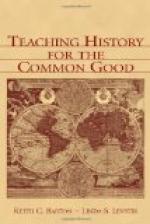If the teacher expects the class to deal more intensively than the text with the matters discussed in the lesson, a few advance questions will be of great assistance. Suppose, for example, that the text contents itself with saying that for political reasons the first United States Bank was not rechartered, and shortly after informs the reader that the second United States Bank was rechartered because the State banks had suspended specie payments. The student may or may not be curious about the failure of the first bank to receive a new charter, the operation of State banks, or why they suspended payment in 1814. If he has been properly taught, he probably will be, but if the teacher wishes to discuss these considerations in detail at the next recitation it will be infinitely better to have the facts contributed by the class than for the teacher to do the reciting. It is quite possible that the individual answers to advance questions assigned with such a purpose will be incomplete, but the interest of the class will be incalculably greater if they themselves furnish the bulk of the additional matter required. Collectively the class will usually secure complete answers to reasonable questions. The teacher has his opportunity in supplying such important facts as the students fail to find.
Until the student may reasonably be expected to know the books of the library having to do with his subject, the teacher in giving out an advance lesson should mention by author and title the books most helpful in the preparation of assigned questions; otherwise the student in a perfectly sincere effort to do the work assigned may spend an hour in search of the proper book.
It may be urged that this search is a valuable experience, but it is obviously too costly. As the year advances and the pupil learns more and more about the uses of books and methods of investigation increasingly less specific instruction as to sources should be given by the teacher. Early in the year, with four lessons to prepare daily, the pupil cannot afford an hour simply to search for a book. He needs that hour for preparation of other work, and if by some fortunate conjunction of circumstances his other work is not sufficiently exacting to require it, he cannot hope to appear in history class with a well-prepared lesson if an hour of his time has been spent in simply looking for a book.
It is frequently worth while to spend a few minutes of the recitation in characterizing the epoch in which the events of the lesson take place or in listening to a brief character sketch of the men contributing to these events. Care should of course be taken that biography does not usurp the place of history, but it materially adds to the interest of the recitation if the kings, generals, and statesmen cease to be merely historical characters and become human beings.
His acquaintance with the great men and women of history will be vitalized




